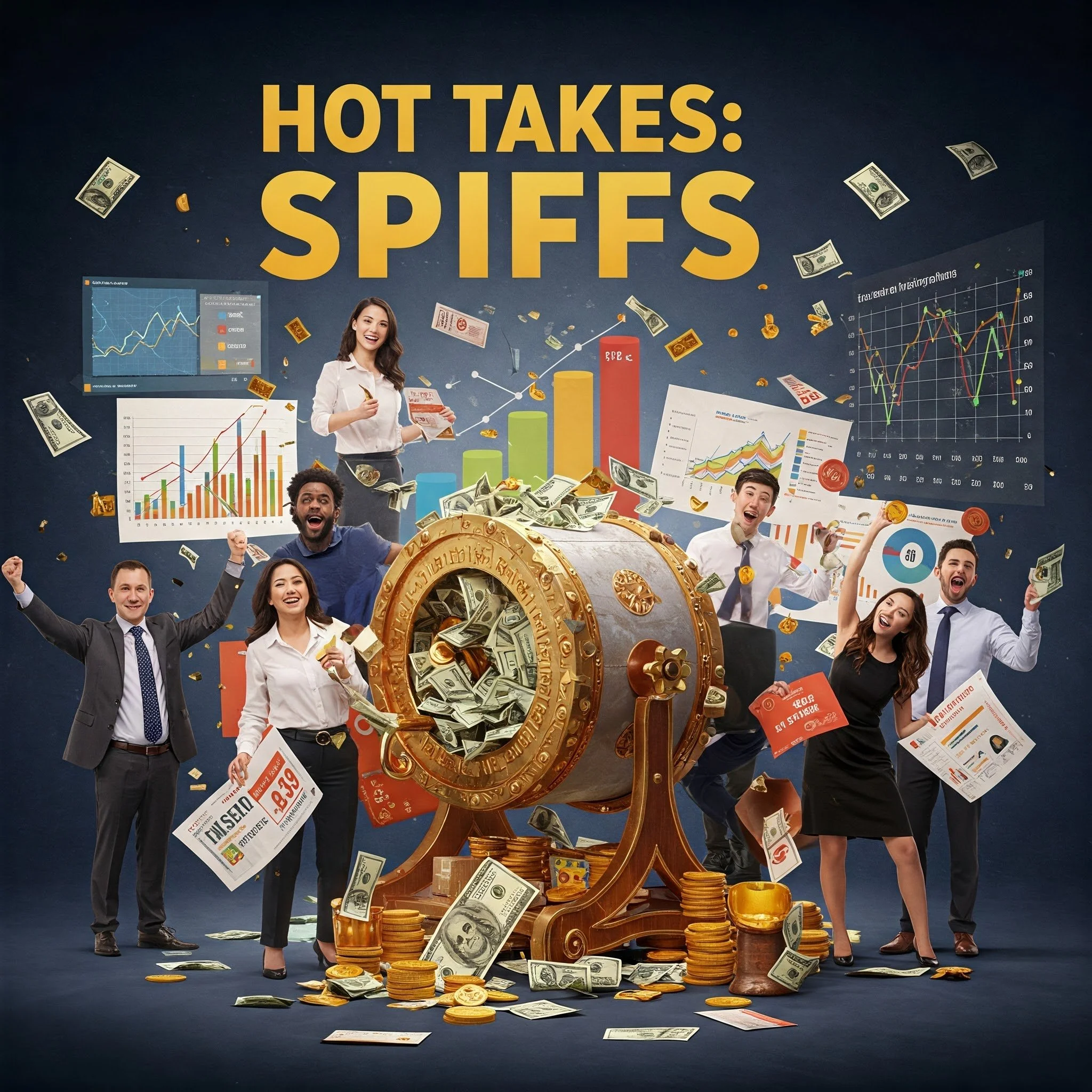HOT TAKE: SPIFFs
Alright, here's a hot take on SPIFFs (Sales Performance Incentive Funds). Over the years, I've been involved in hundreds of SPIFFs, either as a salesperson, an AE myself, as a sales manager, a sales leader for startups and scale-ups, or even seeing it from the back end, through sales operations and supporting the work of sales finance. And here is decades of experimentation condensed into a hot take - enjoy!
The most effective SPIFFs that I've ever seen focus on a series of very specific actions and they allow for flexibility. They remain focused on helping the customer in the way that you're best able to as an organisation, but also not excluding new, less tenured, or even struggling AEs. Let me give you some detail.
The issue with SPIFFs
So in sales, obviously top performers earn more money; if you sell more, you earn more, it's as simple as that. And sales is very pragmatic, if not cut-throat, in this way.
The issue with some SPIFFs is that you put the onus on hard-to-achieve results or very specific situations, which only incentivise the people who already have momentum in that direction. Let me give you an example.
Maybe you put a kicker in place for over-achievement, and the kicker starts at 80% with a small kicker and then it jumps up at 90%.But really, when you want to earn big money, you have to win 120% to 130%.
If people were struggling to get to that percentage in sales anyway, will this kicker really push them further in that direction? I’ve personally never seen an underperforming AE suddenly spring to over-achievement through a SPIFF like this.
Also, the AEs hitting those numbers were probably going to perform at that level in any case, and it's questionable if the SPIFF could generate a significant return from just them – who usually represent about 2-10% of the sales organisation.
It's far better to really motivate the middling 60%; that's where you see massive impact from SPIFFs.
Another potential issue is the cadence of reinforcement. Kicking a SPIFF off and then leaving it until the end of the quarter with the occasional Slack message or reminder isn't a strong enough reinforcement. You need something regular.
A truly great SPIFF
Entry criteria
It focuses on rewarding specific behaviours that drive sales outcomes, not just the outcomes themselves. For example, you might award points for:
Completing a specific type of demo.
Adding a specific product to a deal.
Generating a certain number of outbound leads that convert to a meeting.
These are all tangible actions that any salesperson, regardless of their current performance, can undertake. To make it inclusive, you can weigh these actions based on their difficulty or impact.
So, a simple demo might be one point, while an outbound demo could be worth five points. This encourages everyone to participate and rewards effort and key activities. If you want to drive adoption of new products, you could award points to those products.
Process
Now, at the end of each week or the end of each month, depending on what your pay cycle or sales cycle is like, you want to get the team together and you want to do a raffle draw.
For each point that the salesperson has, they get their name entered with a ticket once. So if I do a demo, I get one ticket and my name's in there once. If I do an outbound demo, I get five tickets, my name's in there five times.
You add that all into a big system, and then you randomly generate who wins different prizes. The prizes each week can be anything from a token to get a free coffee, to a half-day off, to a reduction in quota, to a laptop, to a holiday – anything as small or as big as you like and as big as the budget allows.
Cadence
What's particularly powerful about this weekly/monthly raffle is its ongoing reinforcement. Every week, every AE has the chance to win and win big if they take the appropriate actions.
What's interesting about this is that you're celebrating the individual elements of performance that increase the overall opportunities for the sales organisation, and that individual, regardless of where they sit within the organisation's success structure.
You're also focusing on key actions that you want to generate habits around and you're creating an immediate feedback loop to reinforce the behaviour with your sales organisation. It's exciting, it's scalable, it's easy to define, it's hard to hack, and it works in all the SPIFFs I've seen working throughout the years.

